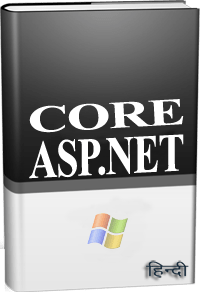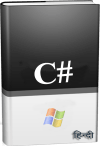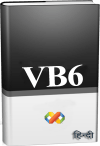Description
यदि आप Microsoft के .NET Framework पर आधारित ASP.NET WebForms Technology का प्रयोग करते हुए Professional Level Web Applications Develop करना सीखना चाहते हैं, तो ये पुस्तक निश्चित रूप से आपके लिए काफी उपयोगी साबित होगी जिसमें निम्न Contents को विभिन्न प्रकार के Examples द्वारा काफी सरल भाषा में व काफी विस्तार से समझाया गया है:
Index of Contents
ASP.NET – The Introduction
Web Development Evolution
Characteristics and Features of ASP.NET
ASP.NET is Part of .NET Framework
ASP.NET is Compiled, Not Interpreted
ASP.NET is Multilanguage
ASP.NET Runs in CLR
ASP.NET is Object Oriented
ASP.NET is for Multi-Device and Multi-Browser
ASP.NET is Easy to Deploy and Configure
ASP.NET 2.0 – Microsoft’s Standard Web Development Model
Master Pages
Themes
Navigation
Security and Membership
Data Source Controls
Web Parts
Profiles
ASP.NET 3.5 (LINQ and AJAX)
ASP.NET 4 (MVC)
Consistent XHTML Rendering
Updated Browser Detection
Session State Compression
Opt-In View State
Extensible Caching
Chart Control
Better Deployment Tools
ASP.NET MVC
Test-Driven Development
Control over HTML Markup
ASP.NET 4.5
ASP.NET Overview
ASP.NET Structure
ASP.NET Core Platform
ASP.NET Web Forms
ASP.NET – Past and Future of Web Forms
Web Forms
Why ASP.NET WebForms
Weaknesses in Modern Web
Usefulness in Current Perspective
The AJAXT
Classic ASP.NET – The WebForms Model
AJAX – The Built-in Feature of Web
The Future
ASP.NET MVC
ASP.NET Web Pages
ASP.NET – IIS (Internet Information Services)
Web Server Environment
ASP.NET and IIS – The History
HTTP Request Flow in IIS
IIS .5 – The New Features
Deploying ASP.NET Web Applications
Web Site Applications – XCopy Deployment
Packaging Files and Settings
Website Precompilation
Configuring IIS for ASP.NET Applications
Application Warm-up and Preloading
ASP.NET – The Applications
ASP.NET Application Architecture
Application Domain
Application Lifetime
Application Updates
Application Directory Structure
Global.asax Application File
Application Events
ASP.NET Configuration
The Machine.config File
<machineKey> Section
The Web.config File
Configuration Inheritance
<location> Elements
<system.web>
<system.webServer>
<appSettings>
<connectionStrings>
Accessing/Manipulating Configuration Sections Programmatically
Extending Configuration File Structure
Configuration Sections Encryption
HTTP Handlers and Modules
ISAPI Extensibility Model
Writing HTTP Handlers
Writing HTTP Modules
URL Routing
WebForms Routing
.NET Components
ASP.NET – Working with Webpages
Adding Web Applications Components
Adding New HTML File
Adding Folders for Static Resources
Relative Resource References
Running Web Application
Making Page Dynamic Using Inline Code Block
Adding Page Directive to Dynamic Page
Adding Inline Code Block to Dynamic Page
Adding and Calling Methods 0
Making Page Dynamic Using Code-Behind File
Preparing Page for Code-Behind File
Creating and Configuring Code-Behind File
ASP.NET Fundamentals
ASP.NET Page Types
ASP.NET Directives
Dealing with Postbacks
ASP.NET Application Folders
Compilation
Custom JavaScript
ASP.NET AJAX – The Client-Side Callback
ASP.NET – Working with Context and Events
Working with ASP.NET Events
Page Events of ASP.NET Web Application
ASP.NET Page Life Cycle
ASP.NET Page Life Cycle Events
Web Application Events
Working with ASP.NET Contexts
Request Object or Request Context
Response Object or Response Context
Server Object or Server Context
Transferring V/s Redirecting Request
Passing Information Between Pages
HttpContext Class – Passing Context
ASP.NET – Working with HTML Forms and States
Page Processing of ASP.NET Web Forms
Working with HTML Form in ASP.NET Page
Working with State in HTML Forms Page
ASP.NET – Web Forms Fundamental Concepts
The Fundamentals of Web Forms
Design Philosophy of Web Forms
The Web Forms Architecture
Advantages of ASP.NET Web Forms
Fast to Build and Simple to Use
Ignore Core Level Details
Slow but Active Technology
Disadvantages of ASP.NET Web Forms
Typical to Maintain
Poor Unit Testability
Extra Bandwidth for View State
Dynamic User Interface of ASP.NET Web Forms
ASP.NET Event Model
Automatic Postbacks
View State
Client-Side Control IDs
Web Forms Processing Stages
Page Framework Initialization
User Code Initialization
Validation
Event Handling
Automatic Data Binding
Cleanup
Page is a Control Container
Showing the Control Tree
The Page Header
Dynamic Control Creation
ASP.NET – Working with WebForms Designer
Creating Empty Web Forms Project
Using Design Surface of Web Forms Page
Using CSS Styling with Web Forms UI Controls
Creating UI Control Event Handlers
ASP.NET – Working with WebForms Controls
Server Controls
Types of Server Controls
Hierarchy of Server Controls
HTML Server Controls
HTML Server Control Classes
Server Side Events Handling
Web Controls
WebControl Base Class
Web Control Classes
Measurement Units
Using Enumerations
Specifying Colors
Specifying Fonts
Understanding Focus
Setting Default Button
Scrollable Panels
Web Control Events Handling
ImageButton Control and Click Event
Basic Web Forms Controls
Understanding Working of Code Behind File Codes
Using List-Based Controls
JavaScript Producer Web Controls
Events Triggering of the Web Control
Bubble Events – The Event Model of Browsers
List Based Controls
Selectable List Controls
BulletedList Control
Input Validation Controls
Validation Controls
Validation Process
BaseValidator Class
RequiredFieldValidator Control
RangeValidator Control
CompareValidator Control
RegularExpressionValidator Control
CustomValidator Control
ValidationSummary Control
ASP.NET 4.5 and Unobtrusive Validation
Using Validators Programmatically
Validation Group Controls
Navigation Controls
Menu Control
TreeView Control
Site Map
SiteMapPath Control
Other Web Controls
Calendar Control
PlaceHolder Control
Wizard Control
MultiView Control
ASP.NET – Working with State Management
State Management
View State
Storing Custom Objects in ViewState Collection
Selectively Disabling View State
View State Security Issues
Cross-Page Data Transfer
Query String
URL Encoding
Cross-Page Posting
Cross-Page Posting in Event Handler
Cross-Page Posting and Validation
Cookies
Session State
Session Architecture
Using Session State
Session State Configuration
Compression
Cookieless
Timeout
Securing Session State
Application State






ajay gupta –
Kuldeep bhai good initiative. i purchased it your all .net related book and reading continually, it is helping, but i feel it need more update for a professional. it is very good for a beginner.
Kuldeep –
Very nice and easy to follow ebook. Even DEMO have approximately more than 100 easy to understand pages to read.